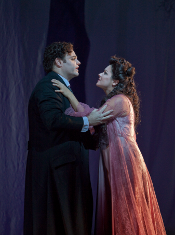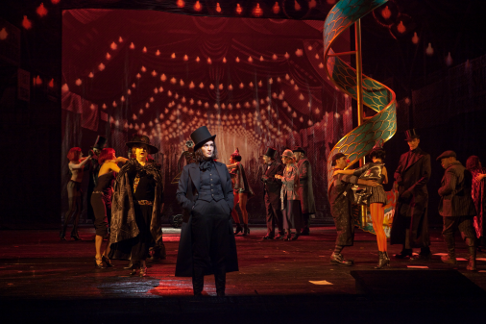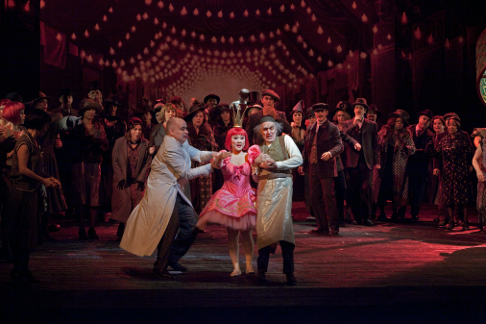![Joseph Calleja as Hoffmann [Photo by Ken Howard courtesy of The Metropolitan Opera]](http://www.operatoday.com/Hoffmann_Calleja.png)
11 Dec 2009
Les Contes d’Hoffmann at the MET
The Tales of Hoffmann is a cruel piece, for all the wit of the macabre tales on which it is based and the sparkle the dying Offenbach put into his last and grandest score.
English Touring Opera are delighted to announce a season of lyric monodramas to tour nationally from October to December. The season features music for solo singer and piano by Argento, Britten, Tippett and Shostakovich with a bold and inventive approach to making opera during social distancing.
This tenth of ten Live from London concerts was in fact a recorded live performance from California. It was no less enjoyable for that, and it was also uplifting to learn that this wasn’t in fact the ‘last’ LfL event that we will be able to enjoy, courtesy of VOCES8 and their fellow vocal ensembles (more below …).
Ever since Wigmore Hall announced their superb series of autumn concerts, all streamed live and available free of charge, I’d been looking forward to this song recital by Ian Bostridge and Imogen Cooper.
The Sixteen continues its exploration of Henry Purcell’s Welcome Songs for Charles II. As with Robert King’s pioneering Purcell series begun over thirty years ago for Hyperion, Harry Christophers is recording two Welcome Songs per disc.
Although Stile Antico’s programme article for their Live from London recital introduced their selection from the many treasures of the English Renaissance in the context of the theological debates and upheavals of the Tudor and Elizabethan years, their performance was more evocative of private chamber music than of public liturgy.
In February this year, Albanian soprano Ermonela Jaho made a highly lauded debut recital at Wigmore Hall - a concert which both celebrated Opera Rara’s 50th anniversary and honoured the career of the Italian soprano Rosina Storchio (1872-1945), the star of verismo who created the title roles in Leoncavallo’s La bohème and Zazà, Mascagni’s Lodoletta and Puccini’s Madama Butterfly.
Evidently, face masks don’t stifle appreciative “Bravo!”s. And, reducing audience numbers doesn’t lower the volume of such acclamations. For, the audience at Wigmore Hall gave soprano Elizabeth Llewellyn and pianist Simon Lepper a greatly deserved warm reception and hearty response following this lunchtime recital of late-Romantic song.
Collapsology. Or, perhaps we should use the French word ‘Collapsologie’ because this is a transdisciplinary idea pretty much advocated by a series of French theorists - and apparently, mostly French theorists. It in essence focuses on the imminent collapse of modern society and all its layers - a series of escalating crises on a global scale: environmental, economic, geopolitical, governmental; the list is extensive.
For this week’s Live from London vocal recital we moved from the home of VOCES8, St Anne and St Agnes in the City of London, to Kings Place, where The Sixteen - who have been associate artists at the venue for some time - presented a programme of music and words bound together by the theme of ‘reflection’.
'Such is your divine Disposation that both you excellently understand, and royally entertaine the Exercise of Musicke.’
Amongst an avalanche of new Mahler recordings appearing at the moment (Das Lied von der Erde seems to be the most favoured, with three) this 1991 Mahler Second from the 2nd Kassel MahlerFest is one of the more interesting releases.
‘And there was war in heaven: Michael and his angels fought against the dragon; and the dragon fought and his angels, And prevailed not; neither was their place found any more in heaven … that old serpent … Satan, which deceiveth the whole world: he was cast out into the earth, and his angels were cast out with him.’
If there is one myth, it seems believed by some people today, that probably needs shattering it is that post-war recordings or performances of Wagner operas were always of exceptional quality. This 1949 Hamburg Tristan und Isolde is one of those recordings - though quite who is to blame for its many problems takes quite some unearthing.
There was never any doubt that the fifth of the twelve Met Stars Live in Concert broadcasts was going to be a palpably intense and vivid event, as well as a musically stunning and theatrically enervating experience.
‘Love’ was the theme for this Live from London performance by Apollo5. Given the complexity and diversity of that human emotion, and Apollo5’s reputation for versatility and diverse repertoire, ranging from Renaissance choral music to jazz, from contemporary classical works to popular song, it was no surprise that their programme spanned 500 years and several musical styles.
The Academy of St Martin in the Fields have titled their autumn series of eight concerts - which are taking place at 5pm and 7.30pm on two Saturdays each month at their home venue in Trafalgar Square, and being filmed for streaming the following Thursday - ‘re:connect’.
The London Symphony Orchestra opened their Autumn 2020 season with a homage to Oliver Knussen, who died at the age of 66 in July 2018. The programme traced a national musical lineage through the twentieth century, from Britten to Knussen, on to Mark-Anthony Turnage, and entwining the LSO and Rattle too.
With the Live from London digital vocal festival entering the second half of the series, the festival’s host, VOCES8, returned to their home at St Annes and St Agnes in the City of London to present a sequence of ‘Choral Dances’ - vocal music inspired by dance, embracing diverse genres from the Renaissance madrigal to swing jazz.
Just a few unison string wriggles from the opening of Mozart’s overture to Le nozze di Figaro are enough to make any opera-lover perch on the edge of their seat, in excited anticipation of the drama in music to come, so there could be no other curtain-raiser for this Gala Concert at the Royal Opera House, the latest instalment from ‘their House’ to ‘our houses’.
"Before the ending of the day, creator of all things, we pray that, with your accustomed mercy, you may watch over us."
![Joseph Calleja as Hoffmann [Photo by Ken Howard courtesy of The Metropolitan Opera]](http://www.operatoday.com/Hoffmann_Calleja.png)
The Tales of Hoffmann is a cruel piece, for all the wit of the macabre tales on which it is based and the sparkle the dying Offenbach put into his last and grandest score.
Not only is the hero a half-mad drunkard, he spends the Prologue poking fun at a crippled dwarf (impersonated by a crouching waiter in the Met’s new production), and the plot makes nasty reference to many another illness, deformity or crippling disorder. Stammers, deafness, simple-mindedness and a hump afflict the four servant roles generally assigned to one character tenor, while the heroines — Hoffmann’s loves — are consumptive, soulless, faithless or simply robotic. The four villains and the hero’s only friend are evidently supernatural which may not count as a handicap. Science, society and medicine are debunked and defiled. The libretto even contains a few swipes at the egos of opera singers. The conclusion of this odd comedy is bitter — despairing of love, Hoffmann takes refuge in drink and in creativity — though in the edition currently on view at the Met (no two Met productions of the work have ever played quite the same score, of which no definitive edition exists) an uplifting choral conclusion has been added to placate us.
Bartlett Sher’s stark but handsome production of Hoffmann, like many other creations of the new Met regime, faces the challenge of following a venerable, popular and attractive one. Why did Otto Schenk’s wacky box of goodies need replacement at all? Who can forget the rathskeller that sank into the stage, or the shop of dizzy, whirling mechanisms that slowly moved downstage to take its place during the gavotte, or Crespel’s blue Biedermeier drawing room with its walls permeable to the demonic Dr. Miracle? Well, we’ll have to forget them because the world moves on, and new varieties of stage magic are in constant demand.
 Joseph Calleja as Hoffmann and Anna Netrebko as Antonia
Joseph Calleja as Hoffmann and Anna Netrebko as Antonia
Sher’s innovations, which are handsome and amusing, may prove less
expensive to keep in shape, relying as they do on projections and a few simple
descending flats. One small arched doorway and three gothic windows —
plus a lot of cushions and a gondola sliding by mid-stage — are enough to
evoke Venice, right? More can often be done with less, and Sher has made that
his watchword. In Act II, for instance, Munich was suggested by wintry light
and a few transparencies, a chair and a spinet. At the opening of Act III, the
audience gasped and cheered as the curtain rose — and yet all we saw was
an array of lanterns, a swagged gauze scrim, that narrow Venetian flat, and a
crowd of singers, dancers, supernumeraries strewn about the stage in attitudes
of artful clutter, dressed in elaborately diverse costumes — hey,
it’s Carnival! — a dozen or so wearing hardly anything, and
implying still less by some Fosse-esque callisthenic dancing. Dress and
lighting are all. The set dazzles without actually being a set, as
insubstantial as the feverish workings of Hoffmann’s brain. The opening
scene, a tavern next door to an opera house, was similarly devised, all kegs
and tables and benches, while the rear of the stage lit up when necessary with
a projection of the Old Met — and Hoffmann’s desk strewn with
unfinished manuscripts was downstage right and remained there most of the
evening. Those who recall the Schenk production may remain sentimental, but
those new to Hoffmann will not feel they missed anything in the way of
glamour or storytelling.
Does anyone other than opera and ballet lovers still read E.T.A. Hoffmann’s once popular stories, also the source of Tchaikovsky’s Nutcracker, Delibes’s Coppélia, Hindemith’s Cardillac and Offenbach’s Le Roi Carrotte? Poe knew Hoffmann’s stories well; they are as grotesque as Poe, but lack the psychological tension that gives Poe’s work its sense of undercurrents untold.
 Kate Lindsey as Nicklausse
Kate Lindsey as Nicklausse
It is Sher’s conceit to meld Hoffmann’s genius with that of the far more familiar Kafka, with whom he has little in common except an openness to the fantastic. Kafka’s tales, though they share Hoffmann’s unease with the inhuman novelties of modern technology that make many sensitive souls feel lost in a rapidly changing world, are more metaphorical and political, rarely just odd for odd’s sake as Hoffmann’s often are. But this permits Sher to set his Hoffmann in Kafka’s 1920s for, seemingly, the sole reward of having the non-singing La Stella enter in flapper dress, and in order to place an iconic typewriter on Hoffmann’s desk. At least the prologue and epilogue are set in the 1920s — the Munich (Antonia) scene appears to be set in the 1820s, and Venice (Giulietta) the eighteenth century, but since Hoffmann is supposedly inventing these tales as he tells them, we can blame his wild imagination for any conflict. Catherine Zuber has costumed the robot Olympia in clown getup and a red-violet wig, the consumptive diva Antonia in a dressing gown, the courtesan Giulietta in panniers that look neither sensual nor comfortable. Hoffmann wears his usual frock coat and Crespel a wonderful nineteenth-century smoking robe and shako.
The directorial conceit offers many felicities — I loved the horse-drawn carriage that brings Dr. Miracle to Crespel’s door, and the winding green dragon in Spalanzani’s workshop that continues to spiral throughout the act — but also many puzzles. Nicklausse seems to be playing both sides in Sher’s vision — granted he/she is the Muse who wishes to blight Hoffmann’s love life in order to keep his genius feeding her lust for art, but here she is truly the Devil’s Advocate, supplying the villain with the ingredients of his manic destructiveness, handing the doctor his flasks, the inventor his spectacles, Dapertutto the diamond to tempt Giulietta, remaining on stage to manage the wickedness in scenes where Nicklausse has nothing to sing. This is distracting, but a real offense is the hymn to salvation through love tacked on to the epilogue, derived from the Muse’s final song, when the moral of the story the opera tells, and the motivation behind all of the Muse’s behavior, is that love is empty, that only by his creative genius can Hoffmann be redeemed. The new ending feels false and wrong.
Joseph Calleja undertook to learn the long and strenuous role of Hoffmann when Rolando Villazon’s career crashed and burned last winter. The Maltese tenor is tall and sturdy and a passionate actor, with a wide range and a wonderful liquid top, but at the second performance of the run he sounded uncomfortable, perhaps merely tired, at many points of the evening, a shade under pitch and with the beginning of a bleat that could be either exhaustion or affectation. Considering the pressures leading up to this premiere (he was obliged to withdraw from the dress rehearsal by illness), I am hoping this less than ideal occasion was simply an off-night. But the part may be too heavy for him.
 Kathleen Kim
Kathleen Kim
The trouser role of Hoffmann’s pal, Nicklausse — who is secretly the Muse of Poetry — has been increasing steadily from edition to edition. On this occasion he/she was elevated from sidekick to prima donna, and Kate Lindsey, young, slim, attractive, with a dark, flawlessly placed mezzo soprano and a range of expression from foolish to satirical to sympathetic, gave it star quality. Although the role is now longer than it ever used to be, she was almost the only singer of the night who never seemed to be struggling for enough breath to support whatever phrase she cared to sing, as loud as might be needed or as softly, persuasively as the drama called for.
Hoffmann’s loves were portrayed by Kathleen Kim, Anna Netrebko and Ekaterina Gubanova. Kim is tiny, charming, pleasant and occasionally shrill as Olympia, the rare role that is easier to sing than it sounds. (I’ve seldom heard a bad one; Natalie Dessay was the best.) Gubanova produced seriously deep, Slavic tones that gave pleasure when not wobbling, but how useful these were to characterize the shallow Giulietta may be doubted. Netrebko sang the most powerful Antonia since Sutherland, and in Sher’s vision (which is not Offenbach’s), her grand operatic posturing worked very well. As in all her roles in French or Italian she sounded, frankly, Russian — something in her manner of creating a phrase is taught in the east, not in the regions where western music was composed. She was wise not to attempt all the heroines.
In this production, there is no attempt to make the four villains look unalike — they are the same man in the same black leather duster, and Hoffmann’s insistence that they are one and the same (and the Devil) therefore strikes us, as it should, as a sign of mental imbalance, of fixation on the fellow in the Prologue who will run off with his girl in the Epilogue. They were sung by shaven-skulled Alan Held, who looks tall and ominous even beside tall Mr. Calleja, but he sometimes seemed to be pushing to fill out the part’s diabolic phrases, high notes were evaded in “Scintille, diamant,” and recollections of James Morris in these roles remain golden and unequaled.
While Mr. Held was the same demon in four acts, Alan Oke played the four ridiculous servants with impressive diversity, from Andrès’s mincing venality to Pitichinaccio’s shambling menace — he even appeared to be short as Frantz, and sang that character’s little song with an exceptionally strong and flavorsome tenor.
James Levine, who is evidently responsible for the choices among editions of the score (there is no version of Hoffmann that someone will not denounce as inauthentic), conducted with a sure, tight hand: the demonic leitmotiv came over as just that, but the “numbers” that traditionally draw applause did so — when they deserved to. The Met’s chorus were splendid and their dancers always work best when their work is not center stage but merely accompanies a drama focused elsewhere.
John Yohalem